Sticking together the mark of a tough town in tough times
Plagued by drought, bushfire, dust storms, mice – and rocked this year by a pandemic boom, now Dubbo is ground zero again.
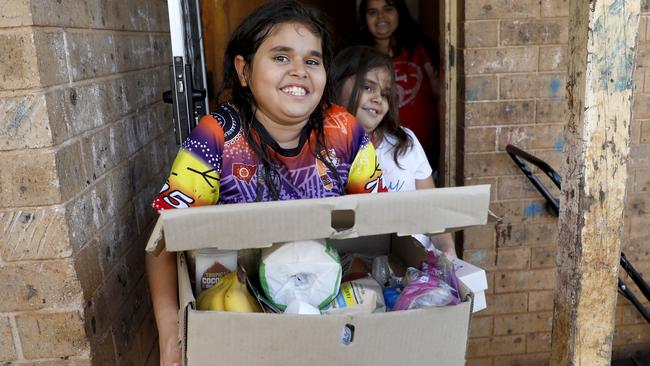
There’s a homegrown adage that if you want to get something done, ask a busy person.
Dubbo is a gritty town of doers, who don’t have to be asked to help, they step up, and keep turning up at this moment of truth for the NSW regional hub of Indigenous culture and rural industry.
A Covid-19 outbreak that started four weeks ago has escalated to 528 cases, with satellite towns regularly reporting new infections, putting immense strain on the health system, community services and policing resources.
It’s spring in western NSW, and this land is showing what it can do if it gets sunshine and rain: it gets to work. Seeing and anticipating Dubbo’s growing needs are the busy souls, the ever-ready connectors, the quiet movers, and the noisy stirrers that try to inspire people to help themselves.
“Even though it’s been traumatic, especially for First Nations people, Covid has brought out the best in us,” Cyrena Harris tells The Weekend Australian. “It’s been a blessing in disguise.”
Harris, 44, is a Tubba Gah Wiradjuri woman, who also identifies as Murawarri, and is part of the Dubbo team of the First Nations Covid Emergency Project.
On Friday she is preparing to deliver survival packs, including personal protective equipment and children’s therapeutic items, for vulnerable people not covered by other charities. As well, Harris has been doing bread and milk runs for elders and organising a fundraising auction. And Harris is always thinking, “what’s next?”, “who is missing out?”, “how can we help our brothers and sisters?”.
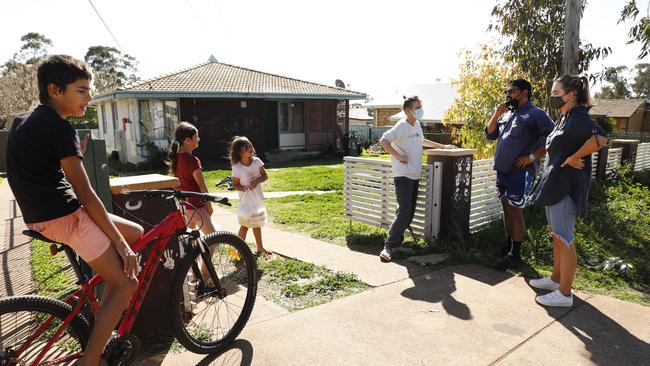
“If you have empathy, and you love Australia, you have a love for all its people,” Harris says.
“Australia has been built on struggle, so we are a resilient people. All races and classes in Dubbo are collaborating, working together, utilising our separate gifts.”
You can call that “Dubbo tough”, a no-fuss love for humans, “don’t want a medal or a picture in the paper, brother” humility, and “we can’t be beaten” ethos.
Dubbo has been plagued by drought, bushfire, dust storms, mice – and was rocked this year by a pandemic boom in tourism that stretched the town’s housing and labour pool.
But now it’s ground zero in the fight against Covid-19 in Indigenous and rural Australia and there is a sense of “trepidation”.
“It’s not quite fear running wild, although it will change pretty quickly if cases keep rising, people die and the lockdown goes on and on,” says a business figure who wants to keep their “head down, bum up”, and turn up for work.
On Friday, Dubbo recorded 33 new cases among the 53 in the Western NSW Local Health District, its second-worst day of the outbreak
State MP for Dubbo Dugald Saunders says there is a growing sense of fatigue with stay-at-home rules and complacency on testing, as well as resentment towards the 5 per cent “wilfully, actively doing the wrong thing”, some of which is related to illicit drugs.
Saunders says Dubbo police were issuing 30 infringements a night for health order breaches.
“People have had a gutful. They see people deliberately showing they don’t care about the rules and putting the rest of us at risk.”
Six months ago Dubbo was “going gangbusters”, according to one civic leader. Tourists were coming in huge numbers to the zoo and historic jail; the jobless rate was the lowest in the nation, employers couldn’t fill some positions and finding a place to rent in town was nigh impossible.
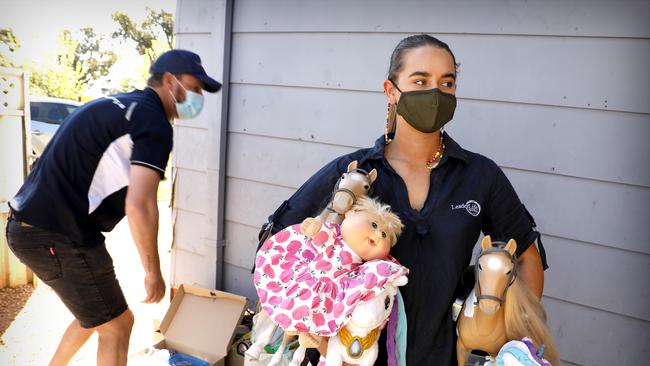
Now, as the weather warms, the economy has cooled. The town’s main employer, meat processor Fletcher International, sent its 600 workers home a fortnight ago due to the virus outbreak.
Isolation, no school, work or sport, and shuttered businesses are the facts of life for 34,000 residents exposed to the caprice of Delta.
Mayor Steve Lawrence says the whole town swung into action, with council workers helping plug holes in food supply chains and keeping local services running.
But things may get worse, with deteriorating mental and physical health expected sooner rather than later, so support workers are racing to get ahead of a brewing storm.
On Friday afternoon at Dubbo’s Apollo House, the home of social enterprise LeaderLife, youth worker Taje Fowler, 24, is loading up food parcels and soft toys for distribution to 30 families around town.
There are lasagnes, pasta dishes, curries and vegetable slices, as well as chocolate brownies. An “All you need is love” sticker is on the bright paper enveloping homemade vanilla cake.
“We’re going out to see the children that usually come here in the afternoon,” says Fowler, a Wurundjeri and Wiradjuri woman studying community and social development for Indigenous communities at Western Sydney University. She runs the Skillbuilders after-school activities for 5-12-year-olds, and collects data for a youth-at-risk research network through UNSW.
With Alex Boney driving the minibus and tooting the horn, and Myles Ryan sorting packages, Fowler drops off the food and goodies. They’re a welcome trio at every stop.
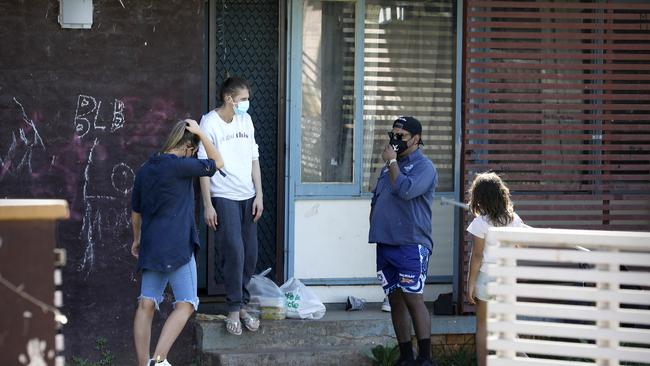
“It’s good to see the smiles on kids’ faces,” Fowler says. “For us, it’s about reconnecting, too, and showing kids that we’re all in this together and that we will get through it together.”
Joh Leader is a paediatric speech pathologist who married a farmer, had two “wild bush boys”, then founded LeaderLife. She’s shuttling between helping with school lessons at home and town, where the mouth of the health and social crisis has a nasty turn to it.
“It just hit us so quickly,” Leader says of the outbreak last month. “A trace in the sewage, and then it went bang! One to 50 cases.”
Apollo House, she says, is usually an after-school cacophony of kids’ games, bikes and school bags strewn about, and energy in abundance. A floral, bright-painted poster, LET’S GROW LIVE LAUGH LOVE, on a green metal fence at the front is fraying and forlorn, but Leader is not daunted.
“At these times I’m looking for the gold, and you see it everywhere,” she says. “Our community is resilient and resourceful, with an amazing bush spirit and we look after each other. Good stuff comes out of hard places.”
Leader says 80 per cent of community work is staying out in front of any crisis, planning and anticipating the needs of kids and their families: womb to tomb. She’s just secured the services of a psychological counsellor.
She says police, military and government services have come to Dubbo’s aid, but they can’t meet basic needs, which can be acute, diverse and urgent in poor, overcrowded households, with poor underlying health conditions across several generations.
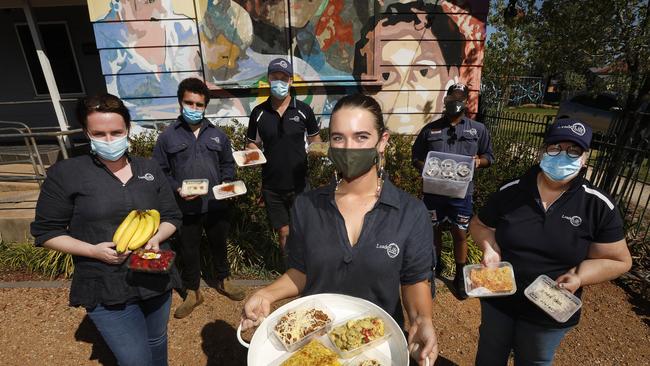
“To climb out of disadvantage in this crazy, wild world is a challenge. We try to empower people, give them the space to make decisions about their lives.
“If there’s a silver lining in this pandemic, it’s that lots of families are recovering, from babies to elders, and are coming through it. So there’s always hope. People are complying, trying to stay calm, and that’s awesome to see.”
Harris and Tina Bonham, manager of the Wirrimbirra service that supports Indigenous families, have been collaborating on survival packs. “I’m so proud of everybody because people are seeing this for what it is, an opportunity,” says Harris. “All titles are out the window. We are just being who we are.”
Bonham says Wirrimbirra means “to preserve and to keep” in Wiradjuri. Families are stronger together, she says, and the pandemic has showcased the best in people.
Here in gutsy Dubbo and beyond.


To join the conversation, please log in. Don't have an account? Register
Join the conversation, you are commenting as Logout